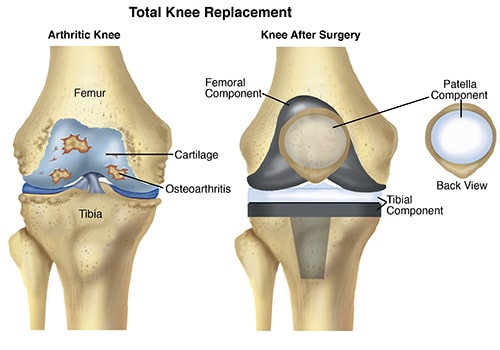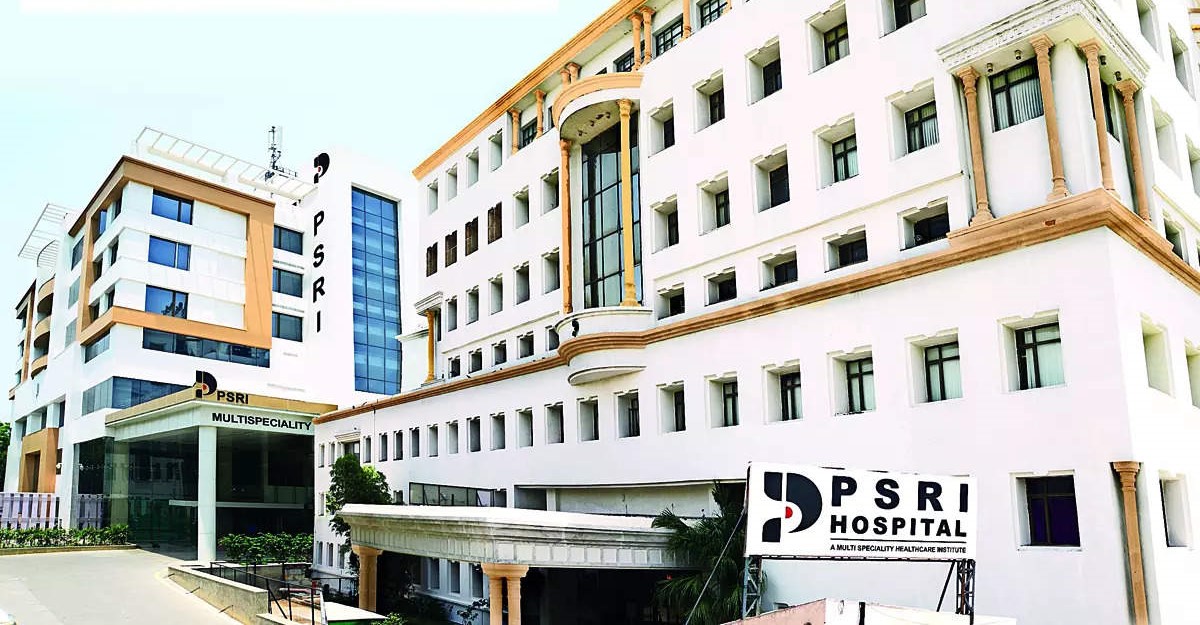
Duration of Treatment
usually takes 2 to 3 hours.
Days of Stay
Usually 3 - 5 days at the hospital and 15 days outside the hospital.
Anesthesia
General anaesthesia.
Cost
3900 to 6000 USD
How Much Does Knee Replacement Surgery Cost in India?
"Looking knee replacement surgery cost in India at the best hospital for knee replacement surgery at an affordable cost in different cities like Delhi, Mumbai, Chennai, Kolkata, and Bangalore? Here, we answer the question and explain how to choose the Best Orthopedic Surgeon in India for better results; our surgeon did more than 3000 knee surgeries successfully. Still, have questions? call our expert team SUBMIT ENQUIRY
- Knee Replacement Surgery Cost in India: starting from 3900 to 6000 USD.
- Robotic Knee Surgery Cost: Starting from 8000 to 9000 USD
- Hotel Cost Near Hospital - starting from 18 to 50 USD (as per hotel services)
- Food Cost - starting from 20 to 30 USD (per day)
- Miscellaneous cost - 20 USD (per day).
- It's an only a rough estimate, final treatment will be planned after the fresh evaluation reports.
- In India, knee Surgery costs can vary as per the diagnosis, patient's conditions, orthopedic surgeon experience, Implant quality, hospital facilities, and city.
- To make an appointment, learn more about the knee, read the below information, or call / WhatsApp/ Viber - our experts to answer at +91 9582708782. Still, have questions? SUBMIT ENQUIRY
Who is the Best Orthopedic Surgeon in India?
- DR.SAJNAY GUPTA
- DR.ANIL ARORA
- DR.RAJEEV VERMA
- DR.ASHOK RAJGOPAL
- DR.RAJU VAISHYA
- DR.PRADEEP SHARMA
- Dr. Rajat Mahajan
- Dr. Somesh Virmani
- Dr. Rashmi Rajat Chopra
- Dr. S K S Marya.
Which is the best hospital for knee replacement in India?
- ARTEMIS HOSPITAL
- MANIPAL HOSPITAL
- BLK HOSPITAL
- FORTIS HOSPITAL
- MEDANTA HOSPITAL
- YASHODHA HOSPITAL
- GLOBAL HOSPITAL
- APOLLO HOSPITAL
- JAYPEE HOSPITAL
- NARAYANA HOSPITAL
Why Choose India for Knee Replacement Surgery?
India has emerged as a preferred destination for knee replacement surgery due to its combination of world-class medical facilities, highly skilled surgeons, and cost-effective treatment options. Below are key reasons to consider India for your knee replacement surgery:
1. Expertise in Orthopedic Surgery
India is home to some of the best orthopedic surgeons globally, known for their vast experience and high success rates in knee replacement procedures.
- Qualified Surgeons: Indian orthopedic surgeons are often trained and certified from renowned institutions in the USA, UK, and Europe.
- Specialized Expertise: Surgeons are proficient in advanced techniques, such as minimally invasive surgery and robotic-assisted knee replacement.
2. State-of-the-Art Medical Facilities
- World-Class Hospitals: Hospitals in India are equipped with the latest technology and adhere to international healthcare standards (NABH, JCI accreditation).
- Advanced Techniques: Use of cutting-edge methods such as computer-assisted surgery and patient-specific implants for precise outcomes.
- Comprehensive Care: Patients receive holistic care, including preoperative evaluation, surgery, and postoperative rehabilitation.
3. Affordable Cost
One of the most significant advantages of choosing India is the cost-effectiveness of medical treatments:
- Cost Savings: Knee replacement surgery in India costs between $4,000 to $7,000 per knee, which is a fraction of the cost in countries like the USA or UK.
- No Compromise on Quality: Despite being cost-effective, the quality of care and medical expertise remains on par with international standards.
4. Transparent and Ethical Practices
- 100% Transparency: Indian medical providers prioritize clear communication regarding treatment options, costs, and expected outcomes.
- Ethical Approach: Patients receive unbiased guidance to help them make informed decisions.
5. High Standards of Safety and Hygiene
- Hospitals maintain stringent protocols to ensure patient safety and zero infection rates.
- Use of sterilized equipment and adherence to global health and safety guidelines.
6. Personalized Patient Care
- Patient-Centered Approach: Dedicated teams ensure personalized attention, from arrival to discharge.
- Multilingual Support: Medical staff are proficient in English and other languages, with translators available for international patients.
- Comprehensive Support: Assistance with travel, visa, accommodation, and post-surgery care.
7. Quick Access to Treatment
- No Long Wait Times: Indian hospitals ensure quick scheduling of surgeries, unlike many Western countries where waiting lists can be lengthy.
8. Postoperative Rehabilitation
- Comprehensive physical therapy and rehabilitation programs to help patients recover quickly and regain mobility.
- Access to skilled physiotherapists and advanced rehabilitation facilities.
9. Medical Tourism Support
- India is a leader in medical tourism, offering complete packages, including:
- Airport pick-up and drop-off.
- Comfortable accommodation near hospitals.
- Assistance with travel and visa documentation.
10. Success Rate and Patient Testimonials
- Knee replacement surgeries in India boast a 95-98% success rate, comparable to or exceeding global standards.
- Satisfied Patients: Thousands of international patients have reported excellent outcomes and a significant improvement in their quality of life.
Why Choose Us for Your Knee Replacement in India?
As one of the leading healthcare service providers, we offer:
- Expert Guidance: Helping you choose the best surgeon and hospital tailored to your needs and budget.
- Affordable Packages: Ensuring cost savings without compromising quality.
- Comprehensive Assistance: From pre-surgery preparations to post-surgery follow-ups, we manage everything for you.
- Trusted Network: Collaborations with top hospitals and highly qualified surgeons in India.
- Seamless Experience: 10+ years of experience in providing exceptional care to international patients.
Conclusion
India is an excellent choice for knee replacement surgery due to its affordable pricing, advanced medical infrastructure, and highly skilled surgeons. By opting for treatment in India, patients can achieve world-class results at a fraction of the cost, all while experiencing exceptional care.
If you’re considering knee replacement surgery, contact us today for a personalized treatment plan, expert guidance, and a hassle-free experience!
What is a Knee replacement?
What is Knee Replacement?
Knee replacement, also known as knee arthroplasty, is a surgical procedure designed to replace damaged or worn-out parts of the knee joint with artificial implants. This procedure is primarily performed to relieve pain and restore mobility in individuals suffering from severe knee joint issues, typically caused by conditions like osteoarthritis, rheumatoid arthritis, or traumatic injuries.
Types of Knee Replacement Surgery:
- Total Knee Replacement (TKR):
The entire knee joint is replaced with artificial components, including the femoral (thigh bone) and tibial (shin bone) surfaces, as well as the kneecap. - Partial Knee Replacement (PKR):
Only the damaged portion of the knee is replaced, preserving healthy bone, cartilage, and ligaments. - Bilateral Knee Replacement:
Both knees are replaced during a single surgery or in two separate surgeries. - Revision Knee Replacement:
A procedure to replace or repair a failed or worn-out knee implant from a previous surgery.
What are the Symptoms of Knee replacement?
Symptoms Indicating You Might Need a Knee Replacement
Knee replacement surgery is often recommended for individuals experiencing severe knee pain and reduced functionality due to joint damage. Here are the primary symptoms that might indicate the need for a knee replacement:
1. Persistent Knee Pain
- Chronic Pain: Pain that persists over time, even when resting, especially during the night.
- Severe Discomfort: Pain that interferes with daily activities such as walking, climbing stairs, or standing for extended periods.
- Dependency on Painkillers: Needing medication regularly to manage knee pain.
2. Swelling and Inflammation
- Chronic Swelling: Persistent swelling in the knee that does not subside with rest or medication.
- Stiffness and Redness: Stiffness in the joint accompanied by redness, which may indicate advanced arthritis or joint damage.
3. Reduced Mobility and Function
- Difficulty Moving: Trouble bending, straightening, or using the knee normally.
- Loss of Range of Motion: Decreased ability to fully flex or extend the knee.
- Reliance on Support: Needing assistive devices like a cane, walker, or crutches for mobility.
4. Grinding Sensation or Joint Instability
- Grinding or Clicking Sounds: Feeling or hearing a grinding sensation (crepitus) when moving the knee joint.
- Knee Instability: The sensation that the knee may give out or buckle under pressure.
5. Deformity in the Knee Joint
- Structural Changes: Visible deformities such as bowing of the knee (inward or outward curvature).
- Uneven Wear: An altered gait or limping due to uneven pressure on the knees.
6. Inadequate Response to Non-Surgical Treatments
- Failed Relief: Lack of improvement after trying treatments like physical therapy, injections (e.g., corticosteroids), or lifestyle changes.
- Progressive Symptoms: Worsening pain and stiffness despite conservative measures.
7. Impact on Quality of Life
- Inability to Perform Daily Tasks: Difficulty with routine activities like sitting, standing, cooking, or playing sports.
- Emotional Impact: Persistent knee issues leading to frustration, depression, or reduced enjoyment of life.
When to See a Doctor?
If you experience the following, consult an orthopedic specialist:
- Pain that significantly limits your activities.
- Symptoms persist or worsen over several months.
- Non-surgical treatments providing little to no relief.
Early diagnosis and treatment can improve your quality of life and prevent further joint damage. If your knee problems significantly impact your daily life, knee replacement surgery might be the right solution.
What are the Risk Factors of Knee replacement?
Risk Factors of Knee Replacement Surgery
While knee replacement surgery is generally safe and effective, as with any major surgical procedure, it carries certain risks. Being aware of these risks helps patients make informed decisions and prepare adequately for the procedure. Below are the common risk factors associated with knee replacement surgery:
1. Risks Related to Anesthesia
- General or Regional Anesthesia Complications:
- Nausea or vomiting after surgery.
- Breathing difficulties, especially in patients with pre-existing conditions like asthma.
- Allergic reactions to anesthesia, although rare.
2. Bleeding and Blood Clots
- Excessive Bleeding:
- During or after surgery, though it is usually controlled effectively.
- Deep Vein Thrombosis (DVT):
- Blood clots in the legs, which can be life-threatening if they travel to the lungs (pulmonary embolism).
- Preventive Measures:
- Blood-thinning medications, compression stockings, and regular movement post-surgery can reduce this risk.
3. Infection
- Superficial Infection:
- At the incision site, which is usually treated with antibiotics.
- Deep Joint Infection:
- Rare but more serious, potentially requiring additional surgery to remove or replace the prosthetic.
4. Temporary Dizziness or Fatigue
- Post-Surgery Dizziness:
- Caused by anesthesia, pain medication, or loss of blood.
- Fatigue:
- Normal in the initial recovery phase as the body heals.
5. Broken Bone
- Fractures Around the Implant:
- Bones surrounding the knee implant can sometimes crack or break during or after surgery, especially in individuals with weak bones (osteoporosis).
6. Nerve Damage
- Injury to Surrounding Nerves:
- Rare but possible, leading to numbness, tingling, or weakness in the affected leg.
- Recovery of Nerve Damage:
- May take months or, in rare cases, could be permanent.
7. Joint Stiffness or Limited Range of Motion
- Inadequate Flexibility:
- Some patients may not regain full motion, especially if physical therapy is not followed diligently.
8. Allergic Reaction to the Prosthetic Material
- Metal Sensitivity:
- Rare allergic reactions to the materials in the implant (e.g., nickel, cobalt, or chromium).
- Alternative Solutions:
- Hypoallergenic implants may be recommended for sensitive patients.
9. Prosthetic Complications
- Implant Loosening or Failure:
- Over time, the implant may wear out, loosen, or fail, necessitating revision surgery.
- Improper Alignment:
- May lead to uneven wear or pain in the joint.
10. Scarring and Cosmetic Concerns
- Visible Scars:
- Surgical incisions may leave permanent scars.
- Keloid Formation:
- Rare excessive scarring in some individuals.
11. Risk Factors Based on Patient Health
- Pre-Existing Conditions:
- Diabetes, obesity, or heart disease can increase the risk of complications.
- Age Factor:
- Older patients may have a slower recovery and higher risk of complications.
Minimizing Risks
- Preoperative Measures:
- Comprehensive health evaluations, blood tests, and imaging studies to ensure fitness for surgery.
- Postoperative Care:
- Following the surgeon’s advice on wound care, physical therapy, and medications to reduce risks.
- Choose an Experienced Surgeon:
- Expertise and skill significantly reduce the likelihood of complications.
Conclusion
While knee replacement surgery carries some risks, advances in medical technology and experienced surgical teams have significantly minimized complications. A careful preoperative evaluation, skilled surgical care, and diligent postoperative follow-up can ensure a smooth recovery and long-term success.
How to prepare for knee replacement surgery?
How to Prepare for Knee Replacement Surgery
Preparation is a crucial step in ensuring the success of knee replacement surgery. Proper preparation minimizes risks and helps in a smoother recovery process. Here’s a detailed guide:
1. Pre-Surgery Check-Up (PSC)
- Blood Tests:
- To evaluate overall health and detect any issues like anemia or infections.
- ECG and ECHO:
- To assess heart health and ensure you are fit for surgery, especially if you have a history of cardiac issues.
- Urine Tests:
- To rule out urinary infections or kidney-related problems.
- Imaging Tests:
- X-rays or MRIs to assess the condition of the knee joint and plan the procedure.
2. Inform the Surgeon About Medical History
- List of Medications:
- Provide a detailed list of any medications, supplements, or over-the-counter drugs you are taking.
- Chronic Conditions:
- Disclose any pre-existing conditions like diabetes, high blood pressure, or allergies.
- Stop Blood Thinners:
- Medications like aspirin, ibuprofen, or warfarin must be discontinued 7-10 days before surgery to prevent excessive bleeding.
3. Consent and Pre-Admission
- Consent Form:
- You will be required to sign a consent form, granting permission for the surgery after understanding the risks and benefits.
- Hospital Admission:
- Patients are typically admitted on the same day as the procedure or a day earlier.
4. Fasting and Dietary Restrictions
- Empty Stomach:
- Fasting is required for at least 8-12 hours before surgery to avoid complications with anesthesia.
5. Lifestyle Adjustments
- Stop Smoking and Alcohol:
- Quit smoking and limit alcohol intake a few weeks before surgery as these can hinder healing and increase infection risk.
- Exercise and Weight Management:
- Engage in light exercises, if possible, to strengthen muscles around the knee for a quicker recovery.
6. Preparing Your Home for Recovery
- Set Up Recovery Space:
- Ensure your home is ready for your return post-surgery with items like a comfortable chair, walker, and elevated toilet seat.
- Remove Hazards:
- Clear clutter, rugs, and other tripping hazards to avoid falls.
7. Financial and Travel Considerations
- Cost of Surgery:
- Knee replacement surgery cost in India typically between $3,900 and $6,000 USD, depending on factors such as:
- Patient’s condition.
- Quality of the implant.
- City, hospital facilities, and the surgeon’s experience.
- Knee replacement surgery cost in India typically between $3,900 and $6,000 USD, depending on factors such as:
- Travel Arrangements:
- Arrange transportation to and from the hospital.
8. Psychological Preparation
- Understand the Procedure:
- Discuss the procedure, risks, and recovery timeline with your surgeon.
- Set Realistic Expectations:
- Understand that initial discomfort and limited mobility are normal but will improve with rehabilitation.
9. Post-Surgery Planning
- Physical Therapy:
- Schedule physical therapy sessions in advance as these are crucial for recovery.
- Caregiver Assistance:
- Arrange for someone to help you during the initial weeks of recovery.
By following these preparation steps, you can significantly improve your surgical outcome and ensure a smoother recovery process. Always consult your surgeon for personalized advice and recommendations.
What are the best procedures for Knee replacement?
Best Procedures for Knee Replacement Surgery
Knee replacement surgery, also known as knee arthroplasty, is a highly effective procedure to alleviate pain and improve mobility in patients suffering from severe knee conditions such as osteoarthritis, rheumatoid arthritis, or injury. The procedure involves replacing damaged parts of the knee joint with artificial components to restore functionality. Below is a detailed guide to the best procedures involved in knee replacement:
1. Preoperative Evaluation
- Diagnosis:
- The surgeon advises a comprehensive evaluation to confirm the need for surgery.
- This includes:
- Blood tests to assess overall health.
- X-rays to determine the extent of joint damage.
- CT scans or MRI imaging for detailed visualization of the joint structure.
- Consultation with Anesthesia:
- Before surgery, an anesthesiologist will discuss options for pain management, including local, regional, or general anesthesia.
2. Key Steps in Knee Replacement Surgery
Step 1: Administration of Anesthesia
- Surgery typically lasts 2 to 3 hours, depending on the complexity.
- Types of anesthesia include:
- General anesthesia: You’ll be unconscious during the procedure.
- Spinal or epidural anesthesia: Numbs the lower half of the body while you remain awake but relaxed.
Step 2: Making the Incision
- Traditional Surgery:
- A vertical incision of about 8 to 10 inches is made along the front of the knee to access the joint.
- Minimally Invasive Surgery (MIS):
- In this approach, a smaller incision of 4 to 6 inches is made, leading to less tissue damage and a faster recovery.
Step 3: Removal of Damaged Tissue
- The surgeon carefully removes:
- Damaged cartilage.
- A thin layer of bone from the femur (thighbone), tibia (shinbone), and patella (kneecap), as needed.
Step 4: Implantation of Prosthesis
- The knee is replaced with a prosthesis designed to mimic the function of a natural joint.
- Prosthesis Components:
- Tibial Component: Resurfaces the top of the tibia.
- Femoral Component: Resurfaces the end of the femur.
- Patellar Component: Resurfaces the underside of the kneecap.
- Material of Prosthesis:
- Typically made of metal (cobalt-chromium alloys or titanium) and plastic (polyethylene) components.
Step 5: Alignment and Adjustment
- The surgeon ensures that the new joint is properly aligned to allow smooth movement and checks for stability and range of motion.
Step 6: Closing the Incision
- Once the prosthesis is securely placed, the surgeon closes the incision using:
- Sutures or Staples: To hold the skin together.
- Skin Adhesives or Tapes: For minimal scarring and quicker healing.
3. Types of Knee Replacement Surgery
-
Total Knee Replacement (TKR):
- Involves replacing both sides of the knee joint.
- Most common procedure for advanced arthritis.
-
Partial Knee Replacement (PKR):
- Only the damaged portion of the knee is replaced.
- Suitable for patients with damage confined to one side of the knee.
-
Revision Knee Replacement:
- A procedure to replace a previously implanted artificial joint that has worn out or failed.
-
Bilateral Knee Replacement:
- Both knees are replaced at the same time (simultaneously) or in separate surgeries (staged).
4. Postoperative Recovery and Care
After the surgery, recovery involves:
- Physical Therapy: To regain strength, mobility, and functionality.
- Pain Management: Medications to alleviate discomfort.
- Follow-Up Visits: Regular consultations to monitor healing and ensure proper function of the prosthesis.
Benefits of Advanced Knee Replacement Procedures
- Improved range of motion.
- Reduced pain and stiffness.
- Long-lasting results (15-20 years with high-quality implants).
- Enhanced quality of life.
By following the best procedures and techniques, knee replacement surgery ensures a successful outcome, allowing patients to return to an active and pain-free lifestyle.
What is the post-op care of Knee replacement?
Post-Operative Care for Knee Replacement Surgery
Post-operative care is crucial for ensuring a smooth recovery and achieving the best results after knee replacement surgery. Below is a detailed guide to the care and recovery process following the procedure:
1. Immediate Post-Surgery Care
-
Hospital Stay:
- Patients typically stay in the hospital for 2–3 days after surgery.
- During this period, the medical team monitors the patient for any complications, such as infection or blood clots.
-
Pain Management:
- Pain relief is provided using medications, which may include opioids, NSAIDs, or local anesthetics.
- Ice packs may also be applied to reduce swelling.
2. Caring for Incisions
- Keep the surgical site clean and dry.
- Dressings will be changed as directed by the healthcare provider.
- Stitches or staples are usually removed 7 to 10 days after surgery.
- Watch for signs of infection, such as redness, swelling, warmth, or discharge from the incision.
3. Mobilization and Walking
- Patients are encouraged to start moving as soon as possible.
- First 48 Hours:
- Standing and walking are allowed with the help of a walker.
- After One Month:
- Patients can transition to using a walking stick or cane for support.
4. Activity Restrictions
- Avoid sitting on the floor or in a cross-legged position.
- Do not put excessive strain on the knee, such as running or jumping, during the recovery period.
- Use high chairs or firm cushions to reduce pressure on the knees when sitting.
5. Physiotherapy and Rehabilitation
-
Physical Therapy Sessions:
- Begin immediately after surgery to regain muscle strength and knee mobility.
- Exercises may include:
- Quadriceps-strengthening exercises.
- Range-of-motion exercises.
- Walking and stair climbing under supervision.
-
Continuous Therapy:
- Regular physiotherapy sessions are crucial for up to 6 weeks or longer until full strength and mobility are restored.
6. Medication and Pain Control
- Take prescribed medications as directed:
- Pain relievers.
- Blood thinners to prevent clots.
- Antibiotics to prevent infection.
- Use over-the-counter pain relievers (as advised) for minor discomfort.
7. Long-Term Recovery
-
6 Weeks Post-Surgery:
- Most patients can resume light activities and return to work if it does not involve heavy physical labor.
-
3–6 Months Post-Surgery:
- Patients typically regain full mobility and can engage in low-impact exercises such as swimming or cycling.
8. Warning Signs to Monitor
Contact your doctor immediately if you notice:
- Persistent fever above 101°F (38.3°C).
- Increased pain or swelling in the knee.
- Difficulty moving the knee or leg.
- Chest pain or shortness of breath (signs of a blood clot).
9. Follow-Up Appointments
- Regular follow-ups are essential to track progress, adjust medications, and ensure the prosthesis is functioning correctly.
By adhering to these post-operative care guidelines, patients can enhance their recovery, improve the longevity of the knee implant, and regain their quality of life.
What is the Success rate of Knee replacement?
Success Rate of Knee Replacement Surgery
The success rate of knee replacement surgery is generally high, making it one of the most effective orthopedic procedures to relieve pain and improve mobility. Below are key details about its success rate:
1. Overall Success Rate
- The success rate of total knee replacement surgery is approximately 90-95% over 10 to 15 years.
- Most patients experience significant pain relief, improved function, and a better quality of life.
2. Factors Affecting Success Rate
Several factors influence the success rate of knee replacement surgery, including:
-
Type of Surgery:
- Total Knee Replacement (TKR) has a slightly higher success rate compared to Partial Knee Replacement (PKR).
- Advanced robotic-assisted surgeries often lead to better precision and outcomes.
-
Patient Condition:
- Patients with severe arthritis or deformities can benefit significantly.
- Outcomes are better when surgery is performed early before severe joint damage occurs.
-
Surgeon’s Expertise:
- The experience and skill of the surgeon play a critical role in achieving a successful outcome.
-
Implant Quality:
- High-quality prosthetic implants are more durable and result in better long-term outcomes.
3. Longevity of Implants
- Studies show that approximately:
- 90-95% of knee implants last 10 years.
- 85% of implants last 20 years or more.
4. Patient Satisfaction
- Over 90% of patients report being satisfied with their surgery results.
- Patients often experience significant pain relief, better mobility, and the ability to resume daily activities.
5. Risk of Complications
- While the success rate is high, complications such as infection, blood clots, or implant wear can occur in a small percentage of cases.
- The complication rate is typically less than 2% in most high-standard hospitals with experienced surgeons.
6. Outcomes for Specific Groups
- Elderly Patients:
- Often experience excellent outcomes, as the surgery improves mobility and reduces dependence on others.
- Younger Patients:
- While younger patients benefit from the procedure, they may require revision surgery later in life due to implant wear.
Conclusion
Knee replacement surgery is a highly successful and life-changing procedure for patients suffering from chronic knee pain and mobility issues. Choosing an experienced surgeon and adhering to pre- and post-operative care guidelines can further enhance the success rate and ensure a smooth recovery.
What Question Ask before Knee replacement?
FAQs Before Knee Replacement Surgery in India
If you’re considering knee replacement surgery in India, it’s natural to have several questions about the procedure, recovery, and associated costs. Below are frequently asked questions to help guide you:
1. What is Knee Replacement Surgery?
Knee replacement surgery, also known as knee arthroplasty, is a procedure in which damaged or worn-out parts of the knee joint are replaced with artificial implants (prostheses). It is performed to relieve pain, improve mobility, and enhance the quality of life for people suffering from severe arthritis or knee injuries.
2. Who is a Candidate for Knee Replacement Surgery?
You may be a candidate for knee replacement surgery if:
- You experience severe knee pain that limits daily activities.
- Non-surgical treatments like medications or physical therapy have failed.
- You have advanced arthritis (osteoarthritis, rheumatoid arthritis).
- You have significant stiffness or deformity in the knee joint.
3. Why Should I Choose India for Knee Replacement Surgery?
India is a preferred destination for knee replacement surgery because:
- Affordable Costs: The cost in India ranges from $3,900 to $6,000, significantly lower than in Western countries.
- Experienced Surgeons: India has highly qualified orthopedic surgeons with extensive experience.
- World-Class Hospitals: Hospitals are equipped with advanced technology and adhere to international standards.
- Short Waiting Times: Immediate scheduling is available for international patients.
4. What Tests Are Required Before Surgery?
You will need to undergo a pre-surgery check-up (PSC), which includes:
- Blood tests.
- ECG (Electrocardiogram) and ECHO for cardiac evaluation.
- Urine tests to assess overall health.
- X-rays or MRI scans to evaluate the knee condition.
5. What Should I Expect During a Consultation?
During your consultation, the surgeon will:
- Review your medical history and physical condition.
- Recommend the most suitable treatment plan.
- Discuss the type of implants to be used.
- Explain potential risks and benefits of the procedure.
6. What Should I Ask the Surgeon Before Surgery?
- Are you a board-certified orthopedic surgeon?
- How many knee replacement surgeries have you performed?
- What is the expected recovery time for someone in my condition?
- What type of implant will be used, and how long will it last?
- Are there any risks or complications I should be aware of?
7. How Should I Prepare for Surgery?
- Stop blood-thinning medications at least 10 days before surgery.
- Remain fasting for 6-8 hours before the procedure.
- Inform your doctor about any medications or health conditions.
- Arrange for post-operative care and assistance at home.
8. Is Knee Replacement Surgery Painful?
During surgery, anesthesia will ensure you don’t feel pain. Post-operative pain is managed with medications and usually decreases within a few weeks.
9. How Long Does the Surgery Take?
The procedure typically takes 2-3 hours, depending on the complexity of the case.
10. What Are the Risks Associated With Knee Replacement Surgery?
Although the surgery is generally safe, risks include:
- Infection.
- Blood clots.
- Nerve or blood vessel damage.
- Allergic reaction to anesthesia.
11. What Happens During the Surgery?
- The surgeon makes an incision to access the damaged knee joint.
- The damaged bone and cartilage are removed.
- The prosthetic components are placed to replicate the knee’s function.
- The incision is closed with sutures or staples.
12. What Is the Recovery Period After Surgery?
- Most patients start walking with assistance within 48 hours of surgery.
- Full recovery typically takes 6-12 weeks.
- Physical therapy is crucial to regain strength and mobility.
13. Will I Need Physical Therapy After Surgery?
Yes, physical therapy is essential for restoring knee function, improving strength, and ensuring a smooth recovery.
14. How Long Do Knee Implants Last?
Modern knee implants usually last 15-20 years or longer, depending on factors like activity level and overall health.
15. What Is the Cost of Knee Replacement Surgery in India?
The cost ranges from $3,900 to $6,000 and depends on:
- Type of implant (standard or advanced).
- Surgeon’s experience.
- Hospital facilities.
- City where the surgery is performed.
16. Can I Travel After Surgery?
Patients are usually advised to wait at least 6 weeks before long-distance travel. Always consult your surgeon before making travel plans.
17. Are There Alternatives to Knee Replacement Surgery?
Alternatives include:
- Medications for pain relief.
- Corticosteroid injections.
- Physical therapy.
- Minimally invasive procedures like arthroscopy.
18. Will I Have a Scar After Surgery?
Yes, there will be a scar, but it usually fades over time. Minimally invasive procedures result in smaller scars.
19. Is Follow-Up Care Required?
Yes, regular follow-up appointments are essential to monitor recovery and address any concerns.
20. How Can I Choose the Best Surgeon and Hospital in India?
- Look for board-certified and experienced surgeons.
- Choose hospitals accredited by NABH or JCI.
- Check patient reviews and success rates of the surgeon and hospital.
By addressing these FAQs, patients can better understand knee replacement surgery, its preparation, and recovery process, ensuring they make well-informed decisions.
Top Doctors
Top Hospitals
KNEE REPLACEMENT SURGERY COST IN INDIA

Duration of Treatment
usually takes 2 to 3 hours.
Days of Stay
Usually 3 - 5 days at the hospital and 15 days outside the hospital.
Anesthesia
General anaesthesia.
Cost
3900 to 6000 USD
How Much Does Knee Replacement Surgery Cost in India?
"Looking knee replacement surgery cost in India at the best hospital for knee replacement surgery at an affordable cost in different cities like Delhi, Mumbai, Chennai, Kolkata, and Bangalore? Here, we answer the question and explain how to choose the Best Orthopedic Surgeon in India for better results; our surgeon did more than 3000 knee surgeries successfully. Still, have questions? call our expert team SUBMIT ENQUIRY
- Knee Replacement Surgery Cost in India: starting from 3900 to 6000 USD.
- Robotic Knee Surgery Cost: Starting from 8000 to 9000 USD
- Hotel Cost Near Hospital - starting from 18 to 50 USD (as per hotel services)
- Food Cost - starting from 20 to 30 USD (per day)
- Miscellaneous cost - 20 USD (per day).
- It's an only a rough estimate, final treatment will be planned after the fresh evaluation reports.
- In India, knee Surgery costs can vary as per the diagnosis, patient's conditions, orthopedic surgeon experience, Implant quality, hospital facilities, and city.
- To make an appointment, learn more about the knee, read the below information, or call / WhatsApp/ Viber - our experts to answer at +91 9582708782. Still, have questions? SUBMIT ENQUIRY
Who is the Best Orthopedic Surgeon in India?
- DR.SAJNAY GUPTA
- DR.ANIL ARORA
- DR.RAJEEV VERMA
- DR.ASHOK RAJGOPAL
- DR.RAJU VAISHYA
- DR.PRADEEP SHARMA
- Dr. Rajat Mahajan
- Dr. Somesh Virmani
- Dr. Rashmi Rajat Chopra
- Dr. S K S Marya.
Which is the best hospital for knee replacement in India?
- ARTEMIS HOSPITAL
- MANIPAL HOSPITAL
- BLK HOSPITAL
- FORTIS HOSPITAL
- MEDANTA HOSPITAL
- YASHODHA HOSPITAL
- GLOBAL HOSPITAL
- APOLLO HOSPITAL
- JAYPEE HOSPITAL
- NARAYANA HOSPITAL
Why Choose India for Knee Replacement Surgery?
India has emerged as a preferred destination for knee replacement surgery due to its combination of world-class medical facilities, highly skilled surgeons, and cost-effective treatment options. Below are key reasons to consider India for your knee replacement surgery:
1. Expertise in Orthopedic Surgery
India is home to some of the best orthopedic surgeons globally, known for their vast experience and high success rates in knee replacement procedures.
- Qualified Surgeons: Indian orthopedic surgeons are often trained and certified from renowned institutions in the USA, UK, and Europe.
- Specialized Expertise: Surgeons are proficient in advanced techniques, such as minimally invasive surgery and robotic-assisted knee replacement.
2. State-of-the-Art Medical Facilities
- World-Class Hospitals: Hospitals in India are equipped with the latest technology and adhere to international healthcare standards (NABH, JCI accreditation).
- Advanced Techniques: Use of cutting-edge methods such as computer-assisted surgery and patient-specific implants for precise outcomes.
- Comprehensive Care: Patients receive holistic care, including preoperative evaluation, surgery, and postoperative rehabilitation.
3. Affordable Cost
One of the most significant advantages of choosing India is the cost-effectiveness of medical treatments:
- Cost Savings: Knee replacement surgery in India costs between $4,000 to $7,000 per knee, which is a fraction of the cost in countries like the USA or UK.
- No Compromise on Quality: Despite being cost-effective, the quality of care and medical expertise remains on par with international standards.
4. Transparent and Ethical Practices
- 100% Transparency: Indian medical providers prioritize clear communication regarding treatment options, costs, and expected outcomes.
- Ethical Approach: Patients receive unbiased guidance to help them make informed decisions.
5. High Standards of Safety and Hygiene
- Hospitals maintain stringent protocols to ensure patient safety and zero infection rates.
- Use of sterilized equipment and adherence to global health and safety guidelines.
6. Personalized Patient Care
- Patient-Centered Approach: Dedicated teams ensure personalized attention, from arrival to discharge.
- Multilingual Support: Medical staff are proficient in English and other languages, with translators available for international patients.
- Comprehensive Support: Assistance with travel, visa, accommodation, and post-surgery care.
7. Quick Access to Treatment
- No Long Wait Times: Indian hospitals ensure quick scheduling of surgeries, unlike many Western countries where waiting lists can be lengthy.
8. Postoperative Rehabilitation
- Comprehensive physical therapy and rehabilitation programs to help patients recover quickly and regain mobility.
- Access to skilled physiotherapists and advanced rehabilitation facilities.
9. Medical Tourism Support
- India is a leader in medical tourism, offering complete packages, including:
- Airport pick-up and drop-off.
- Comfortable accommodation near hospitals.
- Assistance with travel and visa documentation.
10. Success Rate and Patient Testimonials
- Knee replacement surgeries in India boast a 95-98% success rate, comparable to or exceeding global standards.
- Satisfied Patients: Thousands of international patients have reported excellent outcomes and a significant improvement in their quality of life.
Why Choose Us for Your Knee Replacement in India?
As one of the leading healthcare service providers, we offer:
- Expert Guidance: Helping you choose the best surgeon and hospital tailored to your needs and budget.
- Affordable Packages: Ensuring cost savings without compromising quality.
- Comprehensive Assistance: From pre-surgery preparations to post-surgery follow-ups, we manage everything for you.
- Trusted Network: Collaborations with top hospitals and highly qualified surgeons in India.
- Seamless Experience: 10+ years of experience in providing exceptional care to international patients.
Conclusion
India is an excellent choice for knee replacement surgery due to its affordable pricing, advanced medical infrastructure, and highly skilled surgeons. By opting for treatment in India, patients can achieve world-class results at a fraction of the cost, all while experiencing exceptional care.
If you’re considering knee replacement surgery, contact us today for a personalized treatment plan, expert guidance, and a hassle-free experience!
What is a Knee replacement?
What is Knee Replacement?
Knee replacement, also known as knee arthroplasty, is a surgical procedure designed to replace damaged or worn-out parts of the knee joint with artificial implants. This procedure is primarily performed to relieve pain and restore mobility in individuals suffering from severe knee joint issues, typically caused by conditions like osteoarthritis, rheumatoid arthritis, or traumatic injuries.
Types of Knee Replacement Surgery:
- Total Knee Replacement (TKR):
The entire knee joint is replaced with artificial components, including the femoral (thigh bone) and tibial (shin bone) surfaces, as well as the kneecap. - Partial Knee Replacement (PKR):
Only the damaged portion of the knee is replaced, preserving healthy bone, cartilage, and ligaments. - Bilateral Knee Replacement:
Both knees are replaced during a single surgery or in two separate surgeries. - Revision Knee Replacement:
A procedure to replace or repair a failed or worn-out knee implant from a previous surgery.
symptoms
What are the Symptoms of Knee replacement?
Symptoms Indicating You Might Need a Knee Replacement
Knee replacement surgery is often recommended for individuals experiencing severe knee pain and reduced functionality due to joint damage. Here are the primary symptoms that might indicate the need for a knee replacement:
1. Persistent Knee Pain
- Chronic Pain: Pain that persists over time, even when resting, especially during the night.
- Severe Discomfort: Pain that interferes with daily activities such as walking, climbing stairs, or standing for extended periods.
- Dependency on Painkillers: Needing medication regularly to manage knee pain.
2. Swelling and Inflammation
- Chronic Swelling: Persistent swelling in the knee that does not subside with rest or medication.
- Stiffness and Redness: Stiffness in the joint accompanied by redness, which may indicate advanced arthritis or joint damage.
3. Reduced Mobility and Function
- Difficulty Moving: Trouble bending, straightening, or using the knee normally.
- Loss of Range of Motion: Decreased ability to fully flex or extend the knee.
- Reliance on Support: Needing assistive devices like a cane, walker, or crutches for mobility.
4. Grinding Sensation or Joint Instability
- Grinding or Clicking Sounds: Feeling or hearing a grinding sensation (crepitus) when moving the knee joint.
- Knee Instability: The sensation that the knee may give out or buckle under pressure.
5. Deformity in the Knee Joint
- Structural Changes: Visible deformities such as bowing of the knee (inward or outward curvature).
- Uneven Wear: An altered gait or limping due to uneven pressure on the knees.
6. Inadequate Response to Non-Surgical Treatments
- Failed Relief: Lack of improvement after trying treatments like physical therapy, injections (e.g., corticosteroids), or lifestyle changes.
- Progressive Symptoms: Worsening pain and stiffness despite conservative measures.
7. Impact on Quality of Life
- Inability to Perform Daily Tasks: Difficulty with routine activities like sitting, standing, cooking, or playing sports.
- Emotional Impact: Persistent knee issues leading to frustration, depression, or reduced enjoyment of life.
When to See a Doctor?
If you experience the following, consult an orthopedic specialist:
- Pain that significantly limits your activities.
- Symptoms persist or worsen over several months.
- Non-surgical treatments providing little to no relief.
Early diagnosis and treatment can improve your quality of life and prevent further joint damage. If your knee problems significantly impact your daily life, knee replacement surgery might be the right solution.
risk factors
What are the Risk Factors of Knee replacement?
Risk Factors of Knee Replacement Surgery
While knee replacement surgery is generally safe and effective, as with any major surgical procedure, it carries certain risks. Being aware of these risks helps patients make informed decisions and prepare adequately for the procedure. Below are the common risk factors associated with knee replacement surgery:
1. Risks Related to Anesthesia
- General or Regional Anesthesia Complications:
- Nausea or vomiting after surgery.
- Breathing difficulties, especially in patients with pre-existing conditions like asthma.
- Allergic reactions to anesthesia, although rare.
2. Bleeding and Blood Clots
- Excessive Bleeding:
- During or after surgery, though it is usually controlled effectively.
- Deep Vein Thrombosis (DVT):
- Blood clots in the legs, which can be life-threatening if they travel to the lungs (pulmonary embolism).
- Preventive Measures:
- Blood-thinning medications, compression stockings, and regular movement post-surgery can reduce this risk.
3. Infection
- Superficial Infection:
- At the incision site, which is usually treated with antibiotics.
- Deep Joint Infection:
- Rare but more serious, potentially requiring additional surgery to remove or replace the prosthetic.
4. Temporary Dizziness or Fatigue
- Post-Surgery Dizziness:
- Caused by anesthesia, pain medication, or loss of blood.
- Fatigue:
- Normal in the initial recovery phase as the body heals.
5. Broken Bone
- Fractures Around the Implant:
- Bones surrounding the knee implant can sometimes crack or break during or after surgery, especially in individuals with weak bones (osteoporosis).
6. Nerve Damage
- Injury to Surrounding Nerves:
- Rare but possible, leading to numbness, tingling, or weakness in the affected leg.
- Recovery of Nerve Damage:
- May take months or, in rare cases, could be permanent.
7. Joint Stiffness or Limited Range of Motion
- Inadequate Flexibility:
- Some patients may not regain full motion, especially if physical therapy is not followed diligently.
8. Allergic Reaction to the Prosthetic Material
- Metal Sensitivity:
- Rare allergic reactions to the materials in the implant (e.g., nickel, cobalt, or chromium).
- Alternative Solutions:
- Hypoallergenic implants may be recommended for sensitive patients.
9. Prosthetic Complications
- Implant Loosening or Failure:
- Over time, the implant may wear out, loosen, or fail, necessitating revision surgery.
- Improper Alignment:
- May lead to uneven wear or pain in the joint.
10. Scarring and Cosmetic Concerns
- Visible Scars:
- Surgical incisions may leave permanent scars.
- Keloid Formation:
- Rare excessive scarring in some individuals.
11. Risk Factors Based on Patient Health
- Pre-Existing Conditions:
- Diabetes, obesity, or heart disease can increase the risk of complications.
- Age Factor:
- Older patients may have a slower recovery and higher risk of complications.
Minimizing Risks
- Preoperative Measures:
- Comprehensive health evaluations, blood tests, and imaging studies to ensure fitness for surgery.
- Postoperative Care:
- Following the surgeon’s advice on wound care, physical therapy, and medications to reduce risks.
- Choose an Experienced Surgeon:
- Expertise and skill significantly reduce the likelihood of complications.
Conclusion
While knee replacement surgery carries some risks, advances in medical technology and experienced surgical teams have significantly minimized complications. A careful preoperative evaluation, skilled surgical care, and diligent postoperative follow-up can ensure a smooth recovery and long-term success.
preparation
How to prepare for knee replacement surgery?
How to Prepare for Knee Replacement Surgery
Preparation is a crucial step in ensuring the success of knee replacement surgery. Proper preparation minimizes risks and helps in a smoother recovery process. Here’s a detailed guide:
1. Pre-Surgery Check-Up (PSC)
- Blood Tests:
- To evaluate overall health and detect any issues like anemia or infections.
- ECG and ECHO:
- To assess heart health and ensure you are fit for surgery, especially if you have a history of cardiac issues.
- Urine Tests:
- To rule out urinary infections or kidney-related problems.
- Imaging Tests:
- X-rays or MRIs to assess the condition of the knee joint and plan the procedure.
2. Inform the Surgeon About Medical History
- List of Medications:
- Provide a detailed list of any medications, supplements, or over-the-counter drugs you are taking.
- Chronic Conditions:
- Disclose any pre-existing conditions like diabetes, high blood pressure, or allergies.
- Stop Blood Thinners:
- Medications like aspirin, ibuprofen, or warfarin must be discontinued 7-10 days before surgery to prevent excessive bleeding.
3. Consent and Pre-Admission
- Consent Form:
- You will be required to sign a consent form, granting permission for the surgery after understanding the risks and benefits.
- Hospital Admission:
- Patients are typically admitted on the same day as the procedure or a day earlier.
4. Fasting and Dietary Restrictions
- Empty Stomach:
- Fasting is required for at least 8-12 hours before surgery to avoid complications with anesthesia.
5. Lifestyle Adjustments
- Stop Smoking and Alcohol:
- Quit smoking and limit alcohol intake a few weeks before surgery as these can hinder healing and increase infection risk.
- Exercise and Weight Management:
- Engage in light exercises, if possible, to strengthen muscles around the knee for a quicker recovery.
6. Preparing Your Home for Recovery
- Set Up Recovery Space:
- Ensure your home is ready for your return post-surgery with items like a comfortable chair, walker, and elevated toilet seat.
- Remove Hazards:
- Clear clutter, rugs, and other tripping hazards to avoid falls.
7. Financial and Travel Considerations
- Cost of Surgery:
- Knee replacement surgery cost in India typically between $3,900 and $6,000 USD, depending on factors such as:
- Patient’s condition.
- Quality of the implant.
- City, hospital facilities, and the surgeon’s experience.
- Knee replacement surgery cost in India typically between $3,900 and $6,000 USD, depending on factors such as:
- Travel Arrangements:
- Arrange transportation to and from the hospital.
8. Psychological Preparation
- Understand the Procedure:
- Discuss the procedure, risks, and recovery timeline with your surgeon.
- Set Realistic Expectations:
- Understand that initial discomfort and limited mobility are normal but will improve with rehabilitation.
9. Post-Surgery Planning
- Physical Therapy:
- Schedule physical therapy sessions in advance as these are crucial for recovery.
- Caregiver Assistance:
- Arrange for someone to help you during the initial weeks of recovery.
By following these preparation steps, you can significantly improve your surgical outcome and ensure a smoother recovery process. Always consult your surgeon for personalized advice and recommendations.
procedure
What are the best procedures for Knee replacement?
Best Procedures for Knee Replacement Surgery
Knee replacement surgery, also known as knee arthroplasty, is a highly effective procedure to alleviate pain and improve mobility in patients suffering from severe knee conditions such as osteoarthritis, rheumatoid arthritis, or injury. The procedure involves replacing damaged parts of the knee joint with artificial components to restore functionality. Below is a detailed guide to the best procedures involved in knee replacement:
1. Preoperative Evaluation
- Diagnosis:
- The surgeon advises a comprehensive evaluation to confirm the need for surgery.
- This includes:
- Blood tests to assess overall health.
- X-rays to determine the extent of joint damage.
- CT scans or MRI imaging for detailed visualization of the joint structure.
- Consultation with Anesthesia:
- Before surgery, an anesthesiologist will discuss options for pain management, including local, regional, or general anesthesia.
2. Key Steps in Knee Replacement Surgery
Step 1: Administration of Anesthesia
- Surgery typically lasts 2 to 3 hours, depending on the complexity.
- Types of anesthesia include:
- General anesthesia: You’ll be unconscious during the procedure.
- Spinal or epidural anesthesia: Numbs the lower half of the body while you remain awake but relaxed.
Step 2: Making the Incision
- Traditional Surgery:
- A vertical incision of about 8 to 10 inches is made along the front of the knee to access the joint.
- Minimally Invasive Surgery (MIS):
- In this approach, a smaller incision of 4 to 6 inches is made, leading to less tissue damage and a faster recovery.
Step 3: Removal of Damaged Tissue
- The surgeon carefully removes:
- Damaged cartilage.
- A thin layer of bone from the femur (thighbone), tibia (shinbone), and patella (kneecap), as needed.
Step 4: Implantation of Prosthesis
- The knee is replaced with a prosthesis designed to mimic the function of a natural joint.
- Prosthesis Components:
- Tibial Component: Resurfaces the top of the tibia.
- Femoral Component: Resurfaces the end of the femur.
- Patellar Component: Resurfaces the underside of the kneecap.
- Material of Prosthesis:
- Typically made of metal (cobalt-chromium alloys or titanium) and plastic (polyethylene) components.
Step 5: Alignment and Adjustment
- The surgeon ensures that the new joint is properly aligned to allow smooth movement and checks for stability and range of motion.
Step 6: Closing the Incision
- Once the prosthesis is securely placed, the surgeon closes the incision using:
- Sutures or Staples: To hold the skin together.
- Skin Adhesives or Tapes: For minimal scarring and quicker healing.
3. Types of Knee Replacement Surgery
-
Total Knee Replacement (TKR):
- Involves replacing both sides of the knee joint.
- Most common procedure for advanced arthritis.
-
Partial Knee Replacement (PKR):
- Only the damaged portion of the knee is replaced.
- Suitable for patients with damage confined to one side of the knee.
-
Revision Knee Replacement:
- A procedure to replace a previously implanted artificial joint that has worn out or failed.
-
Bilateral Knee Replacement:
- Both knees are replaced at the same time (simultaneously) or in separate surgeries (staged).
4. Postoperative Recovery and Care
After the surgery, recovery involves:
- Physical Therapy: To regain strength, mobility, and functionality.
- Pain Management: Medications to alleviate discomfort.
- Follow-Up Visits: Regular consultations to monitor healing and ensure proper function of the prosthesis.
Benefits of Advanced Knee Replacement Procedures
- Improved range of motion.
- Reduced pain and stiffness.
- Long-lasting results (15-20 years with high-quality implants).
- Enhanced quality of life.
By following the best procedures and techniques, knee replacement surgery ensures a successful outcome, allowing patients to return to an active and pain-free lifestyle.
post procedure
What is the post-op care of Knee replacement?
Post-Operative Care for Knee Replacement Surgery
Post-operative care is crucial for ensuring a smooth recovery and achieving the best results after knee replacement surgery. Below is a detailed guide to the care and recovery process following the procedure:
1. Immediate Post-Surgery Care
-
Hospital Stay:
- Patients typically stay in the hospital for 2–3 days after surgery.
- During this period, the medical team monitors the patient for any complications, such as infection or blood clots.
-
Pain Management:
- Pain relief is provided using medications, which may include opioids, NSAIDs, or local anesthetics.
- Ice packs may also be applied to reduce swelling.
2. Caring for Incisions
- Keep the surgical site clean and dry.
- Dressings will be changed as directed by the healthcare provider.
- Stitches or staples are usually removed 7 to 10 days after surgery.
- Watch for signs of infection, such as redness, swelling, warmth, or discharge from the incision.
3. Mobilization and Walking
- Patients are encouraged to start moving as soon as possible.
- First 48 Hours:
- Standing and walking are allowed with the help of a walker.
- After One Month:
- Patients can transition to using a walking stick or cane for support.
4. Activity Restrictions
- Avoid sitting on the floor or in a cross-legged position.
- Do not put excessive strain on the knee, such as running or jumping, during the recovery period.
- Use high chairs or firm cushions to reduce pressure on the knees when sitting.
5. Physiotherapy and Rehabilitation
-
Physical Therapy Sessions:
- Begin immediately after surgery to regain muscle strength and knee mobility.
- Exercises may include:
- Quadriceps-strengthening exercises.
- Range-of-motion exercises.
- Walking and stair climbing under supervision.
-
Continuous Therapy:
- Regular physiotherapy sessions are crucial for up to 6 weeks or longer until full strength and mobility are restored.
6. Medication and Pain Control
- Take prescribed medications as directed:
- Pain relievers.
- Blood thinners to prevent clots.
- Antibiotics to prevent infection.
- Use over-the-counter pain relievers (as advised) for minor discomfort.
7. Long-Term Recovery
-
6 Weeks Post-Surgery:
- Most patients can resume light activities and return to work if it does not involve heavy physical labor.
-
3–6 Months Post-Surgery:
- Patients typically regain full mobility and can engage in low-impact exercises such as swimming or cycling.
8. Warning Signs to Monitor
Contact your doctor immediately if you notice:
- Persistent fever above 101°F (38.3°C).
- Increased pain or swelling in the knee.
- Difficulty moving the knee or leg.
- Chest pain or shortness of breath (signs of a blood clot).
9. Follow-Up Appointments
- Regular follow-ups are essential to track progress, adjust medications, and ensure the prosthesis is functioning correctly.
By adhering to these post-operative care guidelines, patients can enhance their recovery, improve the longevity of the knee implant, and regain their quality of life.
success rate
What is the Success rate of Knee replacement?
Success Rate of Knee Replacement Surgery
The success rate of knee replacement surgery is generally high, making it one of the most effective orthopedic procedures to relieve pain and improve mobility. Below are key details about its success rate:
1. Overall Success Rate
- The success rate of total knee replacement surgery is approximately 90-95% over 10 to 15 years.
- Most patients experience significant pain relief, improved function, and a better quality of life.
2. Factors Affecting Success Rate
Several factors influence the success rate of knee replacement surgery, including:
-
Type of Surgery:
- Total Knee Replacement (TKR) has a slightly higher success rate compared to Partial Knee Replacement (PKR).
- Advanced robotic-assisted surgeries often lead to better precision and outcomes.
-
Patient Condition:
- Patients with severe arthritis or deformities can benefit significantly.
- Outcomes are better when surgery is performed early before severe joint damage occurs.
-
Surgeon’s Expertise:
- The experience and skill of the surgeon play a critical role in achieving a successful outcome.
-
Implant Quality:
- High-quality prosthetic implants are more durable and result in better long-term outcomes.
3. Longevity of Implants
- Studies show that approximately:
- 90-95% of knee implants last 10 years.
- 85% of implants last 20 years or more.
4. Patient Satisfaction
- Over 90% of patients report being satisfied with their surgery results.
- Patients often experience significant pain relief, better mobility, and the ability to resume daily activities.
5. Risk of Complications
- While the success rate is high, complications such as infection, blood clots, or implant wear can occur in a small percentage of cases.
- The complication rate is typically less than 2% in most high-standard hospitals with experienced surgeons.
6. Outcomes for Specific Groups
- Elderly Patients:
- Often experience excellent outcomes, as the surgery improves mobility and reduces dependence on others.
- Younger Patients:
- While younger patients benefit from the procedure, they may require revision surgery later in life due to implant wear.
Conclusion
Knee replacement surgery is a highly successful and life-changing procedure for patients suffering from chronic knee pain and mobility issues. Choosing an experienced surgeon and adhering to pre- and post-operative care guidelines can further enhance the success rate and ensure a smooth recovery.
faqs from doctor
What Question Ask before Knee replacement?
FAQs Before Knee Replacement Surgery in India
If you’re considering knee replacement surgery in India, it’s natural to have several questions about the procedure, recovery, and associated costs. Below are frequently asked questions to help guide you:
1. What is Knee Replacement Surgery?
Knee replacement surgery, also known as knee arthroplasty, is a procedure in which damaged or worn-out parts of the knee joint are replaced with artificial implants (prostheses). It is performed to relieve pain, improve mobility, and enhance the quality of life for people suffering from severe arthritis or knee injuries.
2. Who is a Candidate for Knee Replacement Surgery?
You may be a candidate for knee replacement surgery if:
- You experience severe knee pain that limits daily activities.
- Non-surgical treatments like medications or physical therapy have failed.
- You have advanced arthritis (osteoarthritis, rheumatoid arthritis).
- You have significant stiffness or deformity in the knee joint.
3. Why Should I Choose India for Knee Replacement Surgery?
India is a preferred destination for knee replacement surgery because:
- Affordable Costs: The cost in India ranges from $3,900 to $6,000, significantly lower than in Western countries.
- Experienced Surgeons: India has highly qualified orthopedic surgeons with extensive experience.
- World-Class Hospitals: Hospitals are equipped with advanced technology and adhere to international standards.
- Short Waiting Times: Immediate scheduling is available for international patients.
4. What Tests Are Required Before Surgery?
You will need to undergo a pre-surgery check-up (PSC), which includes:
- Blood tests.
- ECG (Electrocardiogram) and ECHO for cardiac evaluation.
- Urine tests to assess overall health.
- X-rays or MRI scans to evaluate the knee condition.
5. What Should I Expect During a Consultation?
During your consultation, the surgeon will:
- Review your medical history and physical condition.
- Recommend the most suitable treatment plan.
- Discuss the type of implants to be used.
- Explain potential risks and benefits of the procedure.
6. What Should I Ask the Surgeon Before Surgery?
- Are you a board-certified orthopedic surgeon?
- How many knee replacement surgeries have you performed?
- What is the expected recovery time for someone in my condition?
- What type of implant will be used, and how long will it last?
- Are there any risks or complications I should be aware of?
7. How Should I Prepare for Surgery?
- Stop blood-thinning medications at least 10 days before surgery.
- Remain fasting for 6-8 hours before the procedure.
- Inform your doctor about any medications or health conditions.
- Arrange for post-operative care and assistance at home.
8. Is Knee Replacement Surgery Painful?
During surgery, anesthesia will ensure you don’t feel pain. Post-operative pain is managed with medications and usually decreases within a few weeks.
9. How Long Does the Surgery Take?
The procedure typically takes 2-3 hours, depending on the complexity of the case.
10. What Are the Risks Associated With Knee Replacement Surgery?
Although the surgery is generally safe, risks include:
- Infection.
- Blood clots.
- Nerve or blood vessel damage.
- Allergic reaction to anesthesia.
11. What Happens During the Surgery?
- The surgeon makes an incision to access the damaged knee joint.
- The damaged bone and cartilage are removed.
- The prosthetic components are placed to replicate the knee’s function.
- The incision is closed with sutures or staples.
12. What Is the Recovery Period After Surgery?
- Most patients start walking with assistance within 48 hours of surgery.
- Full recovery typically takes 6-12 weeks.
- Physical therapy is crucial to regain strength and mobility.
13. Will I Need Physical Therapy After Surgery?
Yes, physical therapy is essential for restoring knee function, improving strength, and ensuring a smooth recovery.
14. How Long Do Knee Implants Last?
Modern knee implants usually last 15-20 years or longer, depending on factors like activity level and overall health.
15. What Is the Cost of Knee Replacement Surgery in India?
The cost ranges from $3,900 to $6,000 and depends on:
- Type of implant (standard or advanced).
- Surgeon’s experience.
- Hospital facilities.
- City where the surgery is performed.
16. Can I Travel After Surgery?
Patients are usually advised to wait at least 6 weeks before long-distance travel. Always consult your surgeon before making travel plans.
17. Are There Alternatives to Knee Replacement Surgery?
Alternatives include:
- Medications for pain relief.
- Corticosteroid injections.
- Physical therapy.
- Minimally invasive procedures like arthroscopy.
18. Will I Have a Scar After Surgery?
Yes, there will be a scar, but it usually fades over time. Minimally invasive procedures result in smaller scars.
19. Is Follow-Up Care Required?
Yes, regular follow-up appointments are essential to monitor recovery and address any concerns.
20. How Can I Choose the Best Surgeon and Hospital in India?
- Look for board-certified and experienced surgeons.
- Choose hospitals accredited by NABH or JCI.
- Check patient reviews and success rates of the surgeon and hospital.
By addressing these FAQs, patients can better understand knee replacement surgery, its preparation, and recovery process, ensuring they make well-informed decisions.































